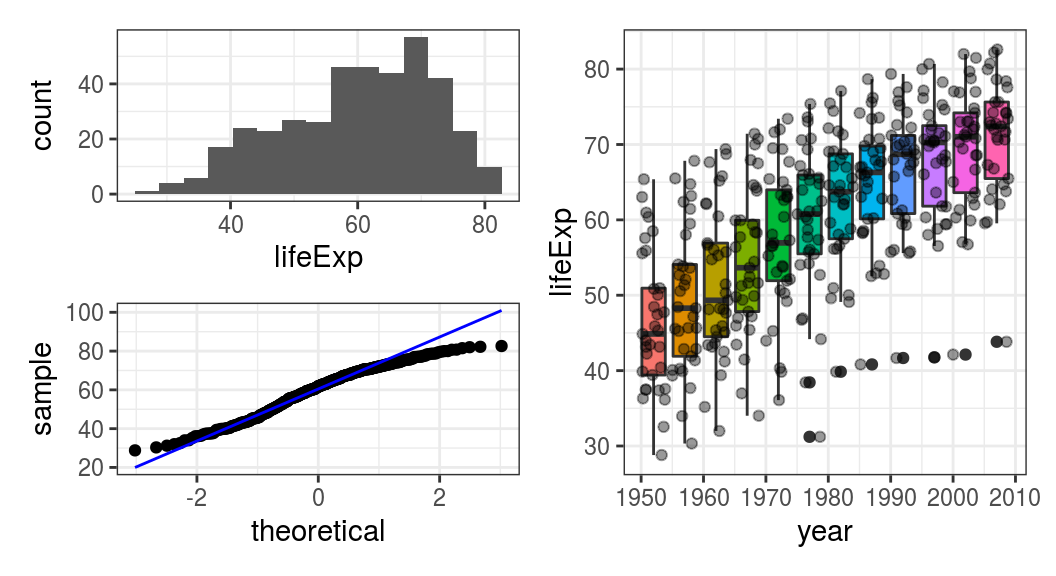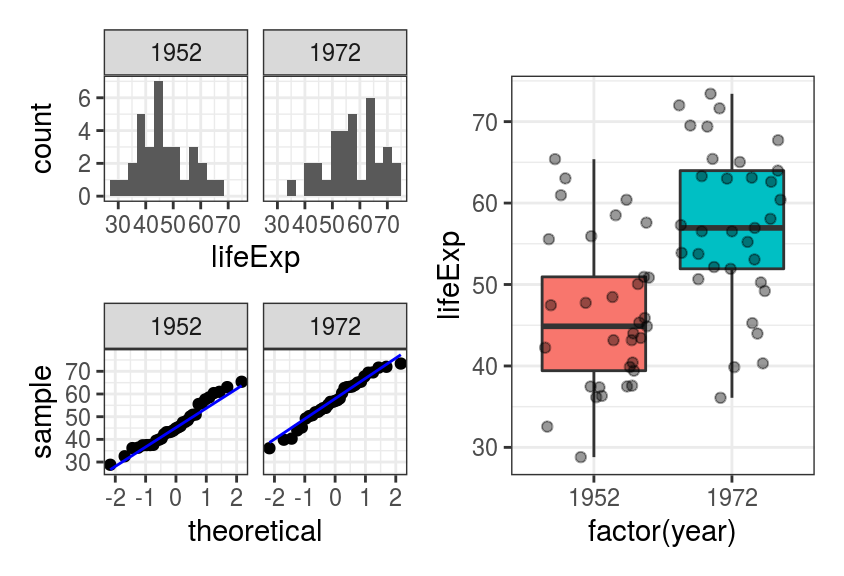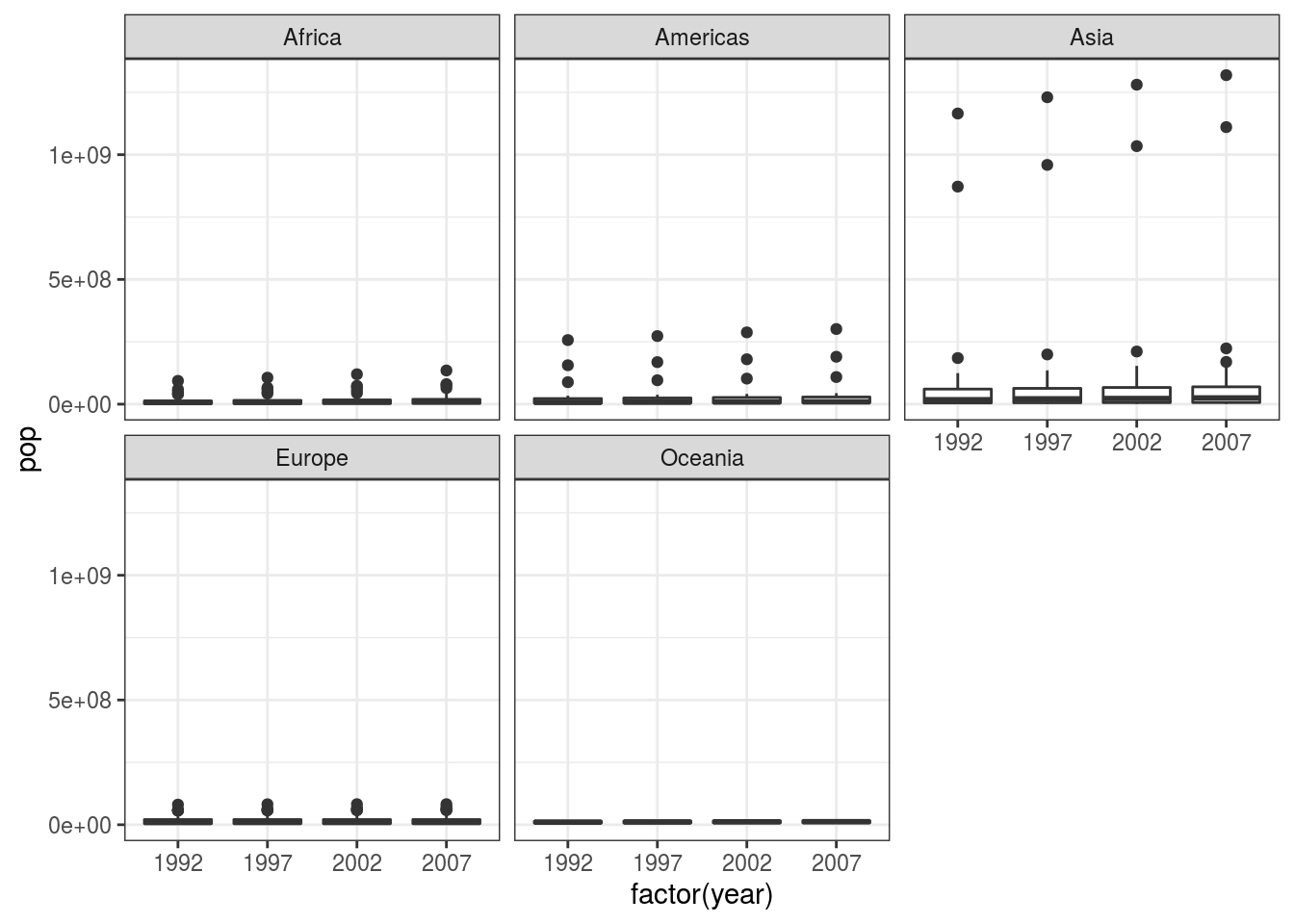6.13 Solutions
Solution to Exercise 6.12.1:
## Make a histogram, Q-Q plot, and a box-plot for the life expectancy
## for a continent of your choice, but for all years.
## Do the data appear normally distributed?
asia_data <- gapdata %>%
filter(continent %in% c("Asia"))
p1 <- asia_data %>%
ggplot(aes(x = lifeExp)) +
geom_histogram(bins = 15)
p2 <- asia_data %>%
ggplot(aes(sample = lifeExp)) + # sample = for Q-Q plot
geom_qq() +
geom_qq_line(colour = "blue")
p3 <- asia_data %>%
ggplot(aes(x = year, y = lifeExp)) +
geom_boxplot(aes(fill = factor(year))) + # optional: year as factor
geom_jitter(alpha = 0.4) +
theme(legend.position = "none")
library(patchwork)
p1 / p2 | p3
Solution to Exercise 6.12.2:
## Select any 2 years in any continent and perform a *t*-test to
## determine whether mean life expectancy is significantly different.
## Remember to plot your data first.
asia_2years <- asia_data %>%
filter(year %in% c(1952, 1972))
p1 <- asia_2years %>%
ggplot(aes(x = lifeExp)) +
geom_histogram(bins = 15) +
facet_wrap(~year)
p2 <- asia_2years %>%
ggplot(aes(sample = lifeExp)) +
geom_qq() +
geom_qq_line(colour = "blue") +
facet_wrap(~year)
p3 <- asia_2years %>%
ggplot(aes(x = factor(year), y = lifeExp)) +
geom_boxplot(aes(fill = factor(year))) +
geom_jitter(alpha = 0.4) +
theme(legend.position = "none")
library(patchwork)
p1 / p2 | p3
##
## Welch Two Sample t-test
##
## data: lifeExp by year
## t = -4.7007, df = 63.869, p-value = 1.428e-05
## alternative hypothesis: true difference in means is not equal to 0
## 95 percent confidence interval:
## -15.681981 -6.327769
## sample estimates:
## mean in group 1952 mean in group 1972
## 46.31439 57.31927Solution to Exercise 6.12.3:
## In 2007, in which continents did mean life expectancy differ from 70
gapdata %>%
filter(year == 2007) %>%
group_by(continent) %>%
do(
t.test(.$lifeExp, mu = 70) %>%
tidy()
)## # A tibble: 5 x 9
## # Groups: continent [5]
## continent estimate statistic p.value parameter conf.low conf.high method
## <fct> <dbl> <dbl> <dbl> <dbl> <dbl> <dbl> <chr>
## 1 Africa 54.8 -11.4 1.33e-15 51 52.1 57.5 One S…
## 2 Americas 73.6 4.06 4.50e- 4 24 71.8 75.4 One S…
## 3 Asia 70.7 0.525 6.03e- 1 32 67.9 73.6 One S…
## 4 Europe 77.6 14.1 1.76e-14 29 76.5 78.8 One S…
## 5 Oceania 80.7 20.8 3.06e- 2 1 74.2 87.3 One S…
## # … with 1 more variable: alternative <chr>Solution to Exercise 6.12.4:
## Use Kruskal-Wallis to determine if the mean population changed
## significantly through the 1990s/2000s in individual continents.
gapdata %>%
filter(year >= 1990) %>%
ggplot(aes(x = factor(year), y = pop)) +
geom_boxplot() +
facet_wrap(~continent)
gapdata %>%
filter(year >= 1990) %>%
group_by(continent) %>%
do(
kruskal.test(pop ~ year, data = .) %>%
tidy()
)## # A tibble: 5 x 5
## # Groups: continent [5]
## continent statistic p.value parameter method
## <fct> <dbl> <dbl> <int> <chr>
## 1 Africa 2.10 0.553 3 Kruskal-Wallis rank sum test
## 2 Americas 0.847 0.838 3 Kruskal-Wallis rank sum test
## 3 Asia 1.57 0.665 3 Kruskal-Wallis rank sum test
## 4 Europe 0.207 0.977 3 Kruskal-Wallis rank sum test
## 5 Oceania 1.67 0.644 3 Kruskal-Wallis rank sum test